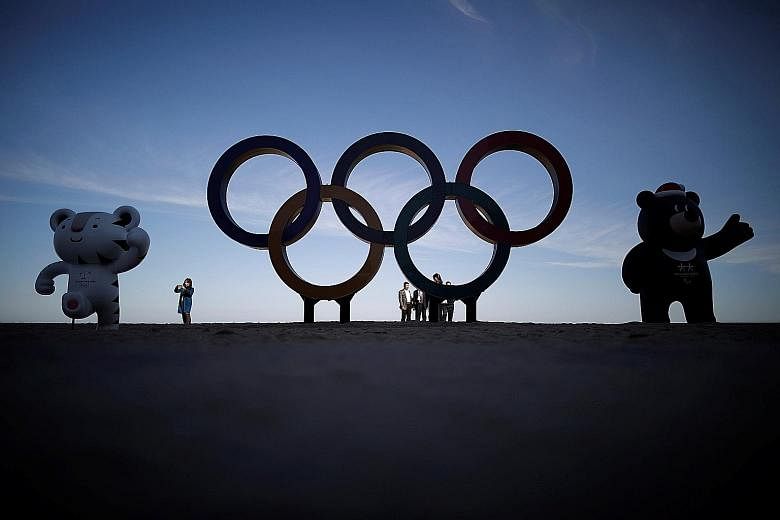The International Olympic Committee (IOC) praised South Korea's "patience and perseverance" after the country finally won the rights to stage the Winter Games after two previous failed attempts.
The same could be said of the country's doggedness in persuading its estranged northern neighbour to participate in the Games next month.
Countless invitations from the administration of President Moon Jae In were all ignored - until now.
The past week has been an almost triumphant one for South Korea, with hopes of reconciliation raised after North Korean leader Kim Jong Un extended a New Year's Day overture and ordered communication to be restored with the South to prepare for an Olympic delegation.
North Korea's IOC representative Chang Ung added more certainty yesterday when he said the reclusive nation was "likely to participate" in the event.
Inter-Korea talks - the first in two years - are set for Tuesday, after President Moon and his US counterpart Donald Trump agreed to postpone their annual joint military drills until after the Games.

Whether sports diplomacy will work on North Korea, however, remains to be seen. It could, in the best-case scenario, create a mood conducive for the nuclear-armed North Korea to return to the negotiating table for talks with its sworn enemy, the United States.
Mr Jon Rainwater, executive director of the US-based Peace Action, noted that the Olympics provided a "perfect rationale" for the delay in military exercises, which in turn "sets the table for ongoing diplomacy".
Mr Scott Snyder, a senior fellow in Korea studies at the Council on Foreign Relations in Washington, said it is no surprise Mr Kim decided to send an Olympics delegation as he has shown a keen interest in sports. "Even a limited North Korean success on the international stage can benefit him in terms of domestic legitimacy and national pride," he told The Sunday Times.
However, Dr Balbina Hwang, visiting professor at Georgetown University, has cautioned against over-optimism that Pyongyang's participation in the Olympics would bring about "any real change in North Korean attitudes or policies".
Sports diplomacy has not proven to make any significant or lasting impact on geopolitics in North-east Asia, she told The Sunday Times.
"Kim Jong Un has not, and will not, change his mind about pursuing nuclear weapons. Note that in 2000, the Koreas marched under a 'united' flag (at the Sydney Olympic Games), but the positive feelings were destroyed over the next decade."
Mr Snyder warned of the possibility of a provocation ahead of the Games, "particularly if North Korea is frustrated with the outcome or negotiations, or sees an opportunity to drive a wedge further between Washington and Seoul".
North Korea has a track record of disrupting major sporting events held in the South. It blew up a Korean Air plane in 1987 before the Seoul Olympics, and sank a South Korean vessel during the 2002 Japan-South Korea World Cup.
The pro-rapprochement Moon administration, however, has moved quickly to embrace the North's overture, even at the risk of falling into a trap.
Discussion is under way about sending a joint Korean team to the opening and closing ceremonies, or having a joint cheer squad.
Pyeongchang county, where the Winter Games will be held, has also offered to send a cruise ship to ferry the North Korean delegation to the South, while Mr Moon, himself an Olympics ambassador, has suggested opening a land route via the cross-border demilitarised zone. That would be a true "symbol of peace", he said.
South Korea's main ally, the US, and neighbouring Japan remain sceptical, and urge vigilance.
Doubts prevail over whether Seoul's eagerness contradicts Washington's hawkish attitude towards Pyongyang.
Questions also remain over the motives behind Mr Kim's overture: Is he trying to drive a wedge between Seoul and Washington, creating friction in the region, or is he truly extending an olive branch?
Even if tensions can be eased during the Olympics, experts say it will not be easy to sustain the positive momentum and nudge North Korea towards negotiations to abandon the nuclear programme it has already declared complete.
Dr Bong Young Shik of Yonsei University's Institute for North Korean Studies told The Sunday Times: "North Korea could say (to the South) that you have successfully hosted the Olympic Games thanks to our support, so you have to give us something in return.
"If the Moon Jae In government refuses, North Korea can quickly turn to missile and nuclear tests, criticising South Korea for failing to uphold its end of the agreement."
He added: "But if it acquiesces, South Korea would (move away from) the international solidarity that puts maximum pressure on North Korea."


